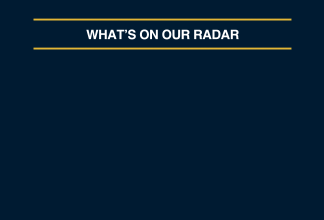U.S. Election Effects: What the Race Could Mean for Investors
Written by The Inspired Investor Team
Published on September 13, 2024
minute read
Share:
|
Key Takeaways
|
What happens in the U.S. rarely stays in the U.S. That’s especially true when it comes to Canada’s relationship with our southern neighbour, where policy and politics can affect trade, currency values and the companies in our portfolios. With one of the most unpredictable U.S. election cycles in history well underway, here are five things Canadian investors should keep in mind come November 5.
Optimism vs. Uncertainty
Naturally, no one can predict how this election will ultimately shake out, but history has a lot to say about how stock markets have performed during and after election years. For instance, since 1944, the S&P 500 has climbed, on average, 6.8 per cent during election years, according to independent investment research company CFRA Research. It’s increased by almost 16 per cent as of July of this year1.
Strong gains in an election year may seem counterintuitive given that investors tend not to like uncertainty, but feelings of optimism – about a new start, for instance – may sometimes be a bigger motivator for markets than unpredictability. While there are several factors that affect the market, overall, it has risen in almost two-thirds of election years since World War II.
Split Congress vs. Majorities
The election determines more than just a U.S. president. Parts of the U.S. Congress and Senate are also determined at the outcome of the race. While Republican and Democratic policies may impact different companies and sectors, markets have mostly climbed regardless of who sits in the House of Representatives or the Senate. The best scenario for investors, though, has been a split Congress (different parties in the Senate and House) with a Democratic president. This scenario has only happened in six years since 1944, but over those years, the S&P 500 has risen, on average, by 16.1 per cent. In the 10 years a Republication oversaw a split Congress, the market increased by an average of 7.3 per cent2.
The second-best outcome for investors has been a Democratic president and a Republican Congress. That’s happened 10 times, with the S&P 500 climbing by an average of 13 per cent. When it comes to one party controlling all levels of government, the Grand Old Party has an edge there – over the eight years the U.S. had a Republican president and Congress, markets increased by an average of 12.9 per cent.
Potential policies
Kamala Harris and Donald Trump have articulated some of their priorities if they were to get elected. Harris, for instance, has talked about increasing the child tax credit3, helping homebuyers with a $25,000 down payment support and upping the corporate tax rate. Trump has talked about extending his 2017 tax cuts4, eliminating taxes on social security benefits and increasing broad tariffs on imports.
But all of this depends upon if their agendas get implemented – and that’s a big if. “Congress is reasonably likely to remain divided, limiting the ambitions of either candidate,” writes RBC Chief Economist Eric Lascelles5. Still, he adds that certain market areas may be impacted more than others. But zeroing in on what stocks might outperform versus others can be difficult. Instead, look at history and how the two parties have governed.
Republicans have historically taken a less stringent attitude to regulation, taxes and government involvement, which tends to be favoured by markets. If Trump gets back into the White House, it could benefit the industrial and financial sectors, writes RBC Wealth Management6. Technology could benefit, too, because of a potential decrease in AI-related regulation, while less immigration may speed up the need for automation.
Democrats, on the other hand, tend to favour renewable energy and infrastructure spending, and a report from RBC Global Asset Management7 expects both areas to benefit under a Harris administration. That would potentially help solar, electric vehicle and other renewable industries, along with construction, engineering and materials companies. Since 1990, the information technology sector has performed best under a Democratic president, climbing by 21.6 per cent verses 6.5 per cent under a Republican president.
A stalemate scenario
All these scenarios assume there is a clear winner on November 5, but given the twists and turns in this election cycle, there is a third scenario to consider, one where no clear winner is named. While this situation is rare, it’s happened before.
In the hanging chad debacle of 2000, where it was unclear whether George W. Bush or Al Gore won Florida, it took about five weeks for Gore to concede. Prior to the election, the stock market was sliding into bear market territory – the tech bubble was about to burst – but the S&P 500 did fall by about 8 per cent that November, rising by 0.4 per cent in December and then climbing by 3.5 per cent in January, once the uncertainty was lifted.
In 2020, Trump still didn’t concede publicly until January 7. In November of that year, the market rose by about 11 per cent and 3.7 per cent in December, before falling 1.1 per cent in January. The S&P 500 then rose in every subsequent month until August, under the Biden administration. Based on these two past examples, it’s not clear what might happen if the election drags on beyond voting day.
Prepare for some volatility
While history is a useful guide on how stocks may perform, the fact is that it’s impossible to predict what might happen come November. At the same time, markets react to a wide variety of issues, regardless of who’s in power in the U.S. Investors may wish to consider their risk tolerance and time horizon for their investments, and prepare for some volatility. If anything, impending rate cuts from the U.S. Federal Reserve could have a much bigger impact on stocks.
1 Source: S&P Global, "U.S. Equities Market Attributes August 2024", September 2024
2 Source: Morgan Stanley, "S&P 500 Index Returns In U.S. Presidential Election Years"
3 Source: AP News, "Having a family is expensive. Here’s what Harris and Trump have said about easing costs", August 2024
4 Source: Politico, "Trump, Harris lay out tax plans with trillions of dollars on the line", August 2024
5 Source: RBC GAM, "MacroMemo - August 27 - September 9, 2024"
6 Source: RBC Wealth Management, "Trump vs. Harris in Spotlight", August 2024
7 Source: RBC Global Asset Manaement, "The US election What does the future hold for clean energy?", August 2024
RBC Direct Investing Inc. and Royal Bank of Canada are separate corporate entities which are affiliated. RBC Direct Investing Inc. is a wholly owned subsidiary of Royal Bank of Canada and is a Member of the Canadian Investment Regulatory Organization and the Canadian Investor Protection Fund. Royal Bank of Canada and certain of its issuers are related to RBC Direct Investing Inc. RBC Direct Investing Inc. does not provide investment advice or recommendations regarding the purchase or sale of any securities. Investors are responsible for their own investment decisions. RBC Direct Investing is a business name used by RBC Direct Investing Inc. ® / ™ Trademark(s) of Royal Bank of Canada. RBC and Royal Bank are registered trademarks of Royal Bank of Canada. Used under licence.
© Royal Bank of Canada 2025.
Any information, opinions or views provided in this document, including hyperlinks to the RBC Direct Investing Inc. website or the websites of its affiliates or third parties, are for your general information only, and are not intended to provide legal, investment, financial, accounting, tax or other professional advice. While information presented is believed to be factual and current, its accuracy is not guaranteed and it should not be regarded as a complete analysis of the subjects discussed. All expressions of opinion reflect the judgment of the author(s) as of the date of publication and are subject to change. No endorsement of any third parties or their advice, opinions, information, products or services is expressly given or implied by RBC Direct Investing Inc. or its affiliates. You should consult with your advisor before taking any action based upon the information contained in this document.
Furthermore, the products, services and securities referred to in this publication are only available in Canada and other jurisdictions where they may be legally offered for sale. Information available on the RBC Direct Investing website is intended for access by residents of Canada only, and should not be accessed from any jurisdiction outside Canada.
Explore More

Here’s What Every Canadian Should Know About Estate Planning
Insights from Leanne Kaufman to help you feel more confident as you plan
minute read

3 Things We're Watching This Week
What the Inspired Investor team is watching
minute read

What’s Driving the Recent Surge in Gold Prices
Here are some things to watch with the gold market
minute read
Inspired Investor brings you personal stories, timely information and expert insights to empower your investment decisions. Visit About Us to find out more.







